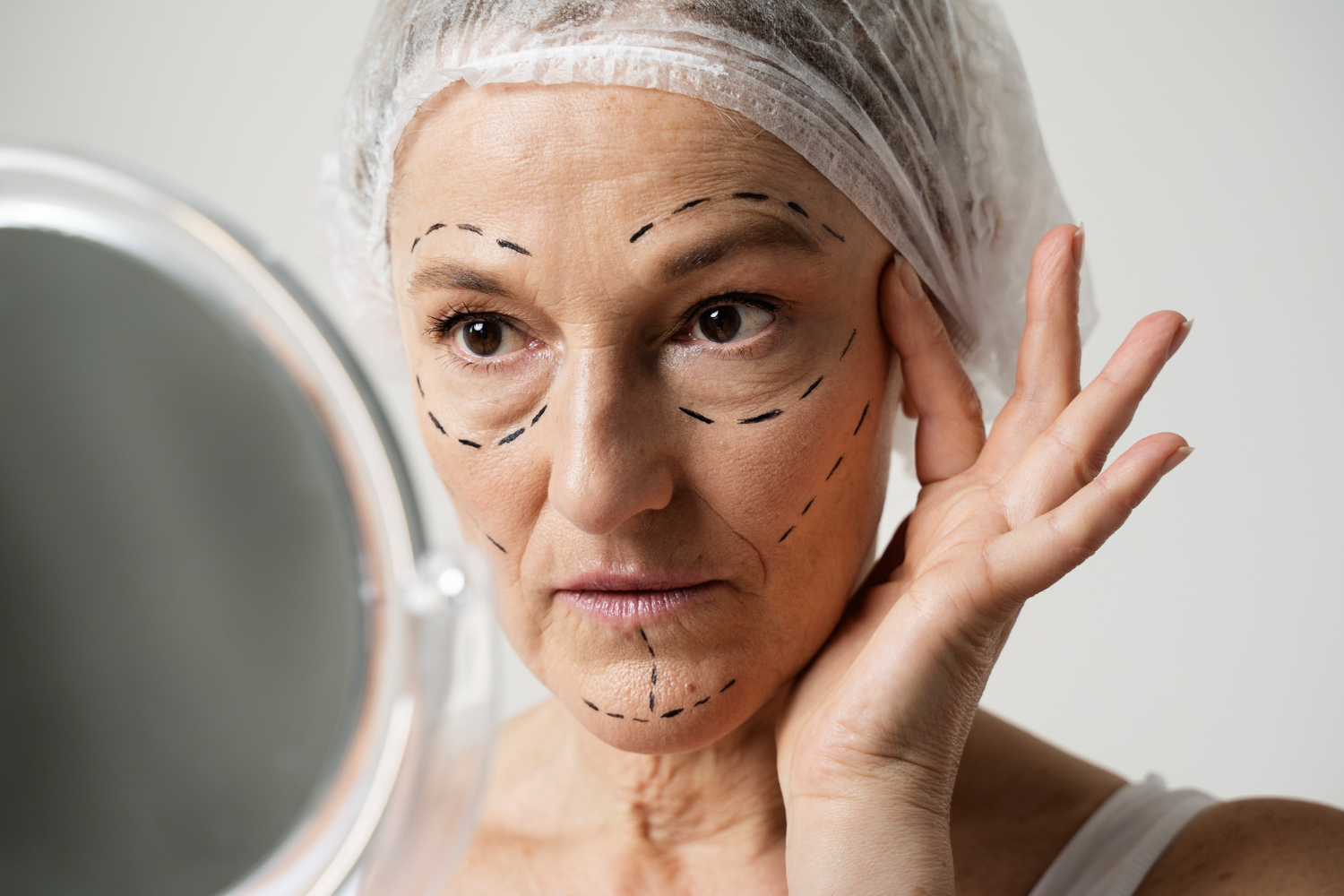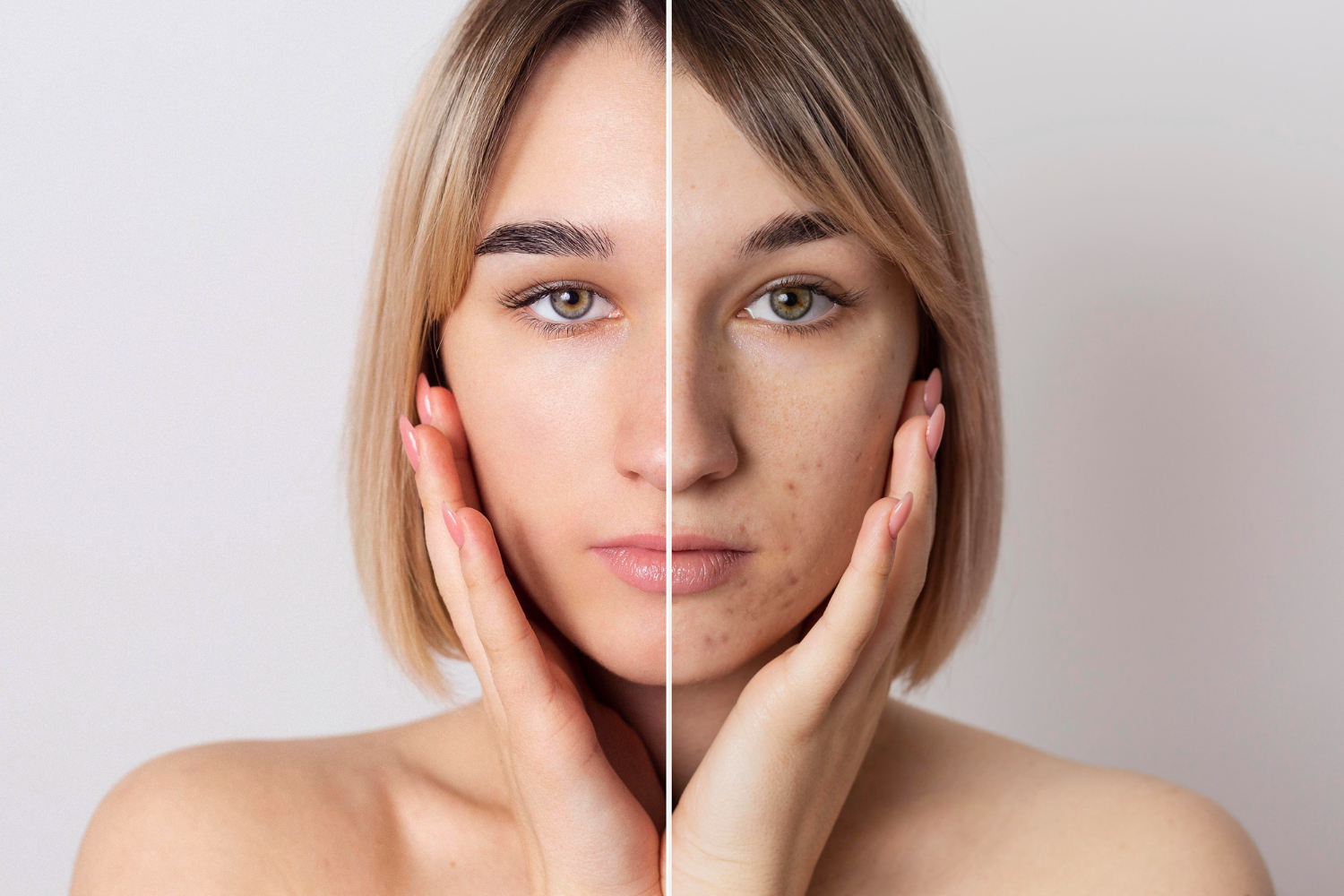
Are you noticing early signs of ageing and wondering how to reverse them?
Ageing is a natural and inevitable process that affects everyone, and while we embrace the wisdom and experiences that come with it, there are certain signs that shouldn’t be overlooked.
In this blog post, we will delve into the common signs of ageing on the face and discuss their underlying causes. Understanding the causes behind these signs can help you take proactive steps towards maintaining a youthful appearance and promoting optimal skin health.
What are the 8 Most Common Signs of Ageing Skin?
Recognising the most common old-age symptoms can help you maintain youthful and healthy skin. Let’s look at the most common signs of ageing that you shouldn’t ignore.
1. Fine lines and wrinkles
View this post on Instagram
As we age, the production of elastin and collagen fibres in our skin decreases, leading to a loss of skin elasticity and firmness. This results in fine lines and wrinkles, especially in areas of repetitive facial movements, such as around the eyes (crow’s feet) and mouth (smile lines).
Bodycraft’s Wrinkle Relaxer Treatment, commonly referred to as the Botox procedure, is an FDA-approved treatment widely recognised for its anti-ageing and anti-wrinkle benefits. This treatment consists of a solution that effectively relaxes the muscles responsible for wrinkles, resulting in smoother, fine lines-free skin.
2. Dullness of skin

The youthful glow of the skin declines over time as the outer layer of the skin (epidermis) loses moisture and slows down the process of shedding dead skin cells. This accumulation of dead skin cells can lead to dull skin and a lacklustre complexion.
3. Uneven skin tone
Ageing can cause an imbalance in skin pigmentation due to factors such as sun exposure, hormonal changes, and natural ageing processes. This can result in areas of hyperpigmentation (dark spots) or hypopigmentation (lighter areas), leading to an uneven and older appearance.
4. Dry skin
As we age, the skin’s ability to retain moisture diminishes, leading to dryness and dehydration. This can make the skin feel rough, tight, and itchy, and contribute to the development of fine lines and wrinkles.
5. Blotchiness and age spots
Over time, the skin can become thinner and more susceptible to damage from environmental factors, particularly UV radiation. This can result in the visibility of blood vessels (blotchiness) and the formation of age spots (also known as liver spots or sunspots), which are darkened patches of skin.
6. Rough skin texture
Signs of ageing skin can lead to a build-up of dead skin cells on the surface, impairing the skin’s ability to shed them naturally. This can result in a rough and uneven texture, making the skin look dull and aged.
7. Visible pores
Changes in skin structure due to ageing, such as a decrease in collagen production and loss of skin elasticity, can cause the pores to appear larger or more prominent. This can give the skin a mature and textured appearance.
8. Saggy Skin
View this post on Instagram
Saggy skin is one of the common early signs of ageing, characterised by a loss of elasticity and firmness, leading to drooping or sagging jowls, especially in areas like the cheeks, jawline, and neck.
Bodycraft’s skin tightening treatment- HIFU, which stands for High-Intensity Focused Ultrasound, is a non-invasive procedure that harnesses focused ultrasound energy to stimulate collagen production in deeper skin layers. This innovative approach is valuable for enhancing skin tightness, reducing sagging, combating signs of ageing, and enhancing overall skin quality.
What are the Causes of Ageing Skin?
Old-age symptoms are primarily caused by a combination of intrinsic and extrinsic factors.
- Intrinsic factors: Genetics and the natural ageing process leading to decreased collagen and elastin production.
- Extrinsic factors: Sun exposure, pollution, smoking, and lifestyle habits. Extrinsic factors accelerate ageing by causing oxidative stress, inflammation, and damage to the skin’s structure and cells.
How to Reverse Signs of Skin Ageing?
To effectively reverse ageing symptoms, it is important to adopt a comprehensive approach. Firstly, protect your skin from harmful UV rays by wearing sunscreen daily. Secondly, develop a skincare routine that includes gentle cleansing, moisturising, and regular exfoliation to promote skin renewal and hydration.
Incorporating anti aging treatments and anti-ageing products with ingredients like retinol, hyaluronic acid, and antioxidants can also help reduce signs of ageing. Additionally, lifestyle factors like maintaining a balanced diet, staying hydrated, quitting smoking, getting enough sleep, and managing stress are crucial in preserving youthful skin and overall well-being.
Takeaway
Being aware of the signs of ageing is vital for maintaining healthy and youthful skin. By recognising these signs you can take proactive steps to address them. Don’t ignore these signs; instead, book your appointment with us today and let our experts help you identify your specific skin concerns and suggest suitable treatments. Together, we can restore and enhance your skin’s natural radiance and promote a more youthful appearance.
FAQs around Signs of Aging
1. At what age does skin ageing start?
Skin ageing can start as early as in the mid-20s, but signs may not be noticeable until the mid-30s or later.
2. How to stop early signs of ageing?
To prevent early signs of ageing, maintain a healthy lifestyle, protect your skin from sun damage, use skincare products with active ingredients, and consider professional treatments.
3. How can I tighten my face?
For effective face tightening, consider non-surgical treatments like coolsculpting, MNRF, microcurrent facials, and facial exercises.
4. Which skin type ages faster?
Generally, individuals who don’t moisturise or apply sunscreen may show signs of ageing faster due to increased susceptibility to UV damage.
5. Why does skin darken with age?
Skin darkens with age due to factors like sun exposure, melanin production changes, accumulation of damaged cells, and decreased skin cell turnover. For more information on how to reduce melanin production, keep our blog!
6. What do celebrities do to keep their skin younger?
Celebrities often follow a skincare regimen that includes regular professional in-clinic treatments like facials, chemical peels, and microdermabrasion, as well as using high-quality skincare products and maintaining a healthy lifestyle.